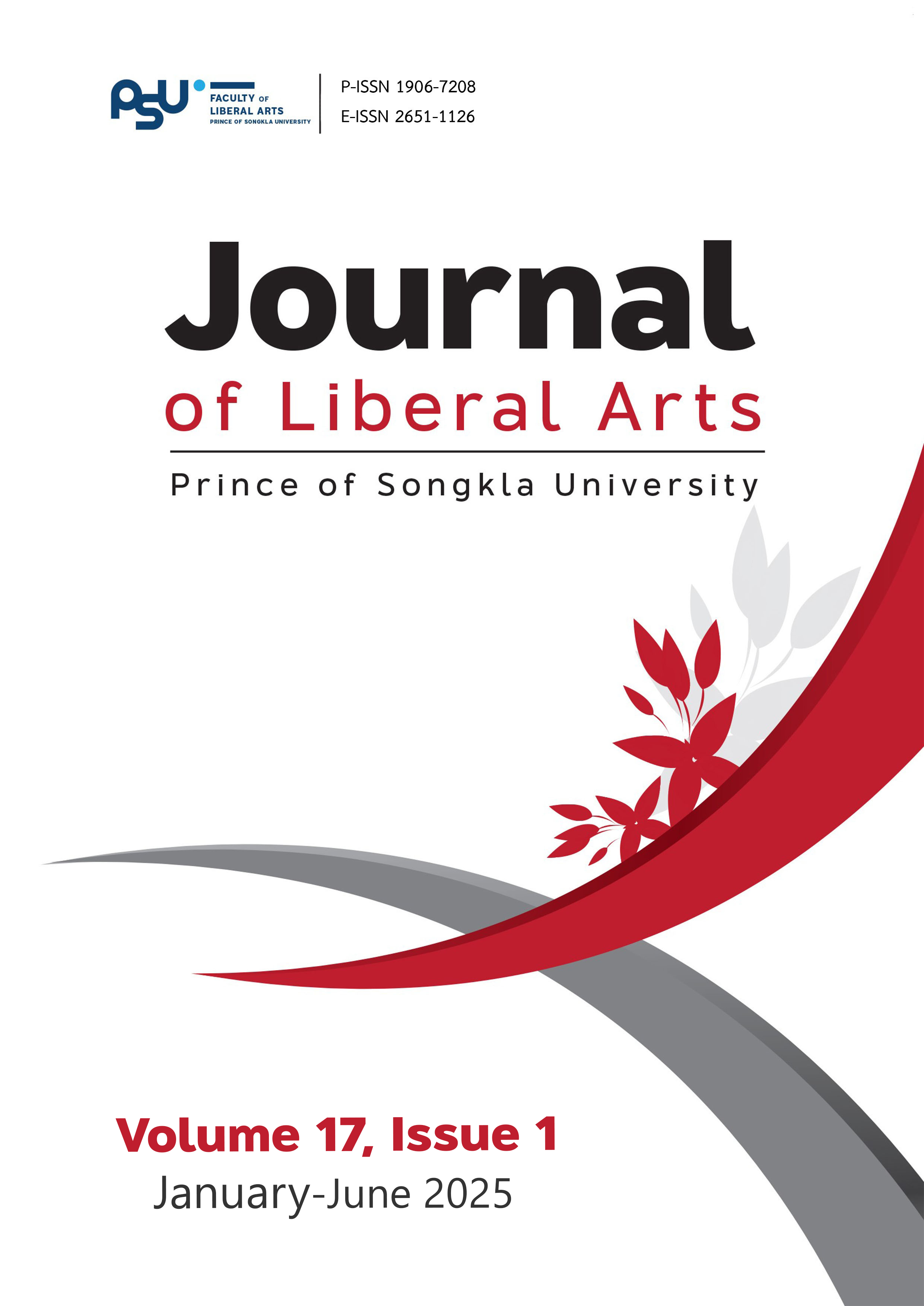The Study of Human Conditions and the Revolt Against Absurd Based on Sartre’s Existentialism and Camus’ Absurdism in Kafka on the Shore
DOI:
https://doi.org/10.14456/jlapsu.2025.6Keywords:
Absurdity, Absurdism, Existentialism, SisyphusAbstract
This study aims to bring the key philosophical concepts of two existentialists, which are Existentialism by Jean-Paul Sartre and Absurdism by Albert Camus, to analyze Kafka, the protagonist of Kafka on the Shore. It examines his life conditions and his decision to continue living, and interprets the key message derived from these philosophical ideas. The novel revolves around the journey of a runaway boy who tries to escape his Oedipal prophecy, only to find it is harder to avoid fulfilling it. His responsibility and anguish stemming from his choice drive him to the brink of suicide, but he ultimately finds his way back to living with hope. Sartre’s concept is used as it emphasizes human existence as inherently purposeless, with humans thrown into the world bearing the responsibility to fulfill their life with meaning. His explanation on various human conditions in his essay, Existentialism is a Humanism, is used to navigate Kafka’s life conditions, including his freedom of choice, self-deception, moral responsibility, alienation, and anguish. Since the novel does not end in tragedy, as is often the case with most existentialist works, Camus’ Absurdism is adopted to explain ways to confront life absurdities through revolt and acceptance. The results of this study could serve as a case study for character analysis to offer a deeper understanding of existentialism and absurdism in Kafka’s life. Camus uses of the Myth of Sisyphus as an inspiring story can also motivate humans to be resilient and persist with hope, the same way as Kafka does.
References
Ali, S. T. (2022). Self-reconciliation and starting a new life in the novel Kafka on the shore by Haruki Murakami. Journal of University of Raparin, 9(2), 440-450. https://doi.org/10.26750/Vol(9).No(2).Paper19
Baggini, J. (2002). Philosophy: Key texts. Palgrave Macmillan London.
Blackstock, J. (2024, July 21). Jean-Paul Sartre: Existentialism, freedom, and the human condition. Taproot Therapy. Retrieved February 23, 2025, from https://gettherapybirmingham.com/jean-paul-sartre-existentialism-freedom-and-the-human-condition/
Camus, A. (1955). The myth of Sisyphus and other essays (J. O’Brien, Trans.). Vintage Books. (Original work published 1955).
Carban, Y. (2021). Digging into the depths of existentialist absurdism through gothic in Haruki Murakami’s Kafka on the shore. Sivas Cumhuriyet University Faculty of Letters Journal of Social Sciences, 45(2), 102-116. http://cujos.cumhuriyet.edu.tr/en/download/article-file/1887007
Cox, G. (2019). How to be an existentialist or how to get real, get a grip and stop making excuses. London Bloomsbury Publishing Plc Bloomsbury Visual Arts.
Laskar, B. (2004). Suicide and the absurd: The influence of Jean-Paul Sartre’s and Albert Camus’s existentialism on Stephen R. Donaldson’s the chronicles of Thomas Covenant the unbeliever. Journal of Fantastic in the Arts, 14(4), 409-426. http://stephenrdonaldson.com/commentary/Laskar01.pdf
Lognion, S. H. (2024). Opening an existential window into Wuthering Heights and the Metamorphosis, Butler Journal of Undergraduate Research, 10(9), 196-209. Retrieved December, 16, 2024, from https://digitalcommons.butler.edu/bjur/vol10/iss1/9
Mondal, D. (2018). The Trial by Kafka: in the light of absurdism and existentialism. International Journal of English Literature and Culture, 6(4), 80-84. https://doi.org/10.14662/IJELC2018.041
Moslehuddin, T. (2021). Existentialism in modern fiction: a critical review of The Metamorphosis and The Outsider. International Journal of Business, Arts and Scientific Study, 2(2), 86-90. https://www.researchgate.net/publication/388664023_Existentialism_in_Modern_Fiction_A_Critical_Review_of_The_Metamorphosis_and_The_Outsider
Murakami, H. (2005) Kafka on the shore. Penguin Vintage.
Onwuatuegwu, I. N. & Arinze, A. T. (2020). The problem of absurdity and its solution in Albert Camus existential philosophy. London Journal of Research in Humanities and Social Sciences, 20(15), 43-45. https://journalspress.com/LJRHSS_Volume20/1422_The-Problem-of-Absurdity-and-Its-Solution-in-Albert-Camus-Existential-Philosophy.pdf
Pölzler, T. (2014). Absurdism as self-help: Resolving an essential inconsistency in Camus’ early philosophy. Journal of Camus Studies, 91-102.
Sartre, J. P. (2007). Existentialism is a humanism (L’existentialisme est un humanisme) (M. Carol, Trans.). Yale University Press. (Original work published 1996).
Warburton, N. (2011). A little history of philosophy. Yale University Press Publications.
Wattanagun, K. & Chotiudompant, S. (2009). The quest and reconstruction of identity in Haruki Murakami’s Kafka on the shore. Manusya: Journal of Humanities. 12(1), 26-39. https://doi.org/10.1163/26659077-01201003
Downloads
Published
How to Cite
Issue
Section
License
Copyright (c) 2025 Khanisara Sittivangkul, Panida Monyanont

This work is licensed under a Creative Commons Attribution-NonCommercial-NoDerivatives 4.0 International License.
The authors retain the copyright to their article but the Journal of Liberal Arts, Prince of Songkla University reserves the exclusive rights to first publication.






